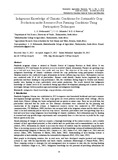| dc.contributor.author | Nethononda, L O | |
| dc.contributor.author | Odhiambo, JJ O | |
| dc.contributor.author | Paterson, D G | |
| dc.date.accessioned | 2013-06-28T14:28:33Z | |
| dc.date.available | 2013-06-28T14:28:33Z | |
| dc.date.issued | 2013 | |
| dc.identifier.citation | Sustainable Agriculture Research; Vol. 2, No. 1; 2013 | en |
| dc.identifier.uri | http://ccsenet.org/journal/index.php/sar/article/view/18040 | |
| dc.identifier.uri | http://erepository.uonbi.ac.ke:8080/xmlui/handle/123456789/41922 | |
| dc.description.abstract | Rambuda irrigation scheme is situated in Vhembe District of Limpopo Province in South Africa. It was
established in 1952 and farmers do not have access to recorded climatic information. Farmers are growing crops
on a trial and error basis, hence low yields and crop loses. The objective of the study was to investigate
indigenous knowledge of climatic conditions relevant for crop production using participatory techniques.
Situation analysis was conducted to gain information on factors influencing crop choice. Participatory exercise
was conducted with 33 of 104 of plot-holders. Farmers could identify climatic factors important for crop
production and those limiting to crop performance. Hot, dry conditions during August to October and January
months were limiting to crops, particularly sweet potato production. The results showed that indigenous
knowledge of climate needs to be considered during agricultural development planning and scientists need to
investigate linkages between modern agro-meteorology and indigenous knowledge. | en |
| dc.language.iso | en | en |
| dc.publisher | University of Nairobi | en |
| dc.subject | indigenous climate knowledge, crop production, sweet potato | en |
| dc.title | Indigenous Knowledge of Climatic Conditions for Sustainable Crop Production under Resource-Poor Farming Conditions Using Participatory Techniques | en |
| dc.type | Article | en |
| local.publisher | College of Biological and Physical Sciences,University of Nairobi | en |

